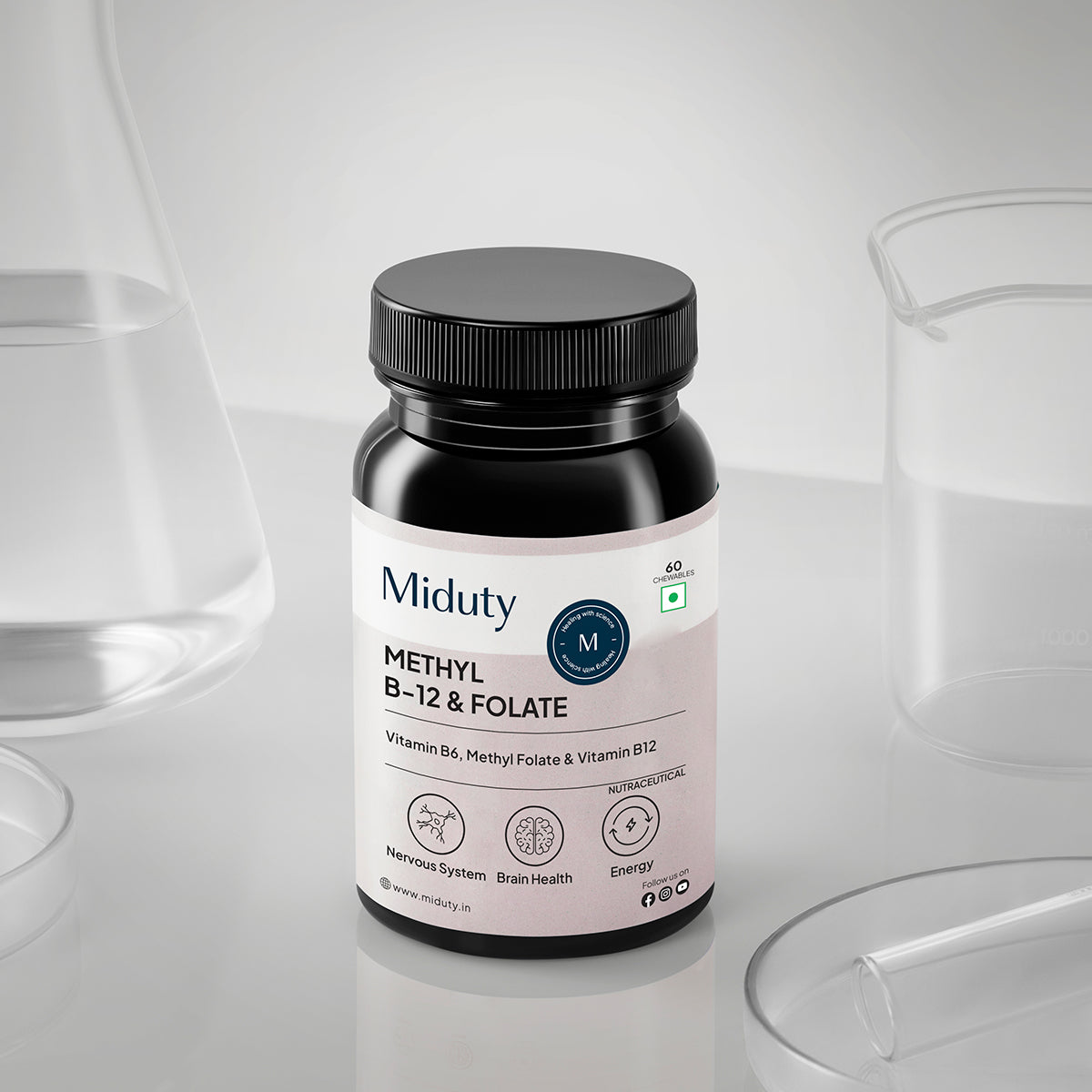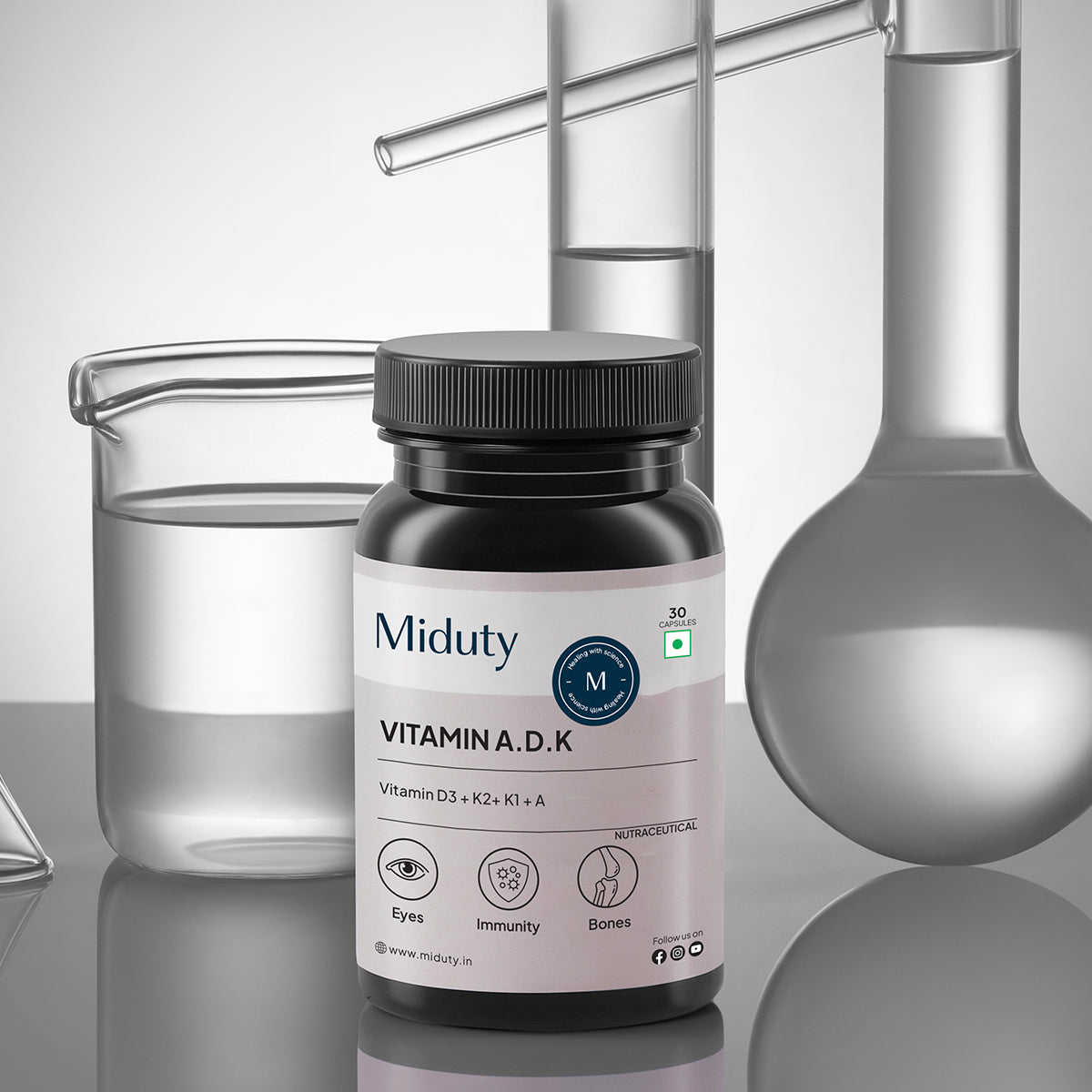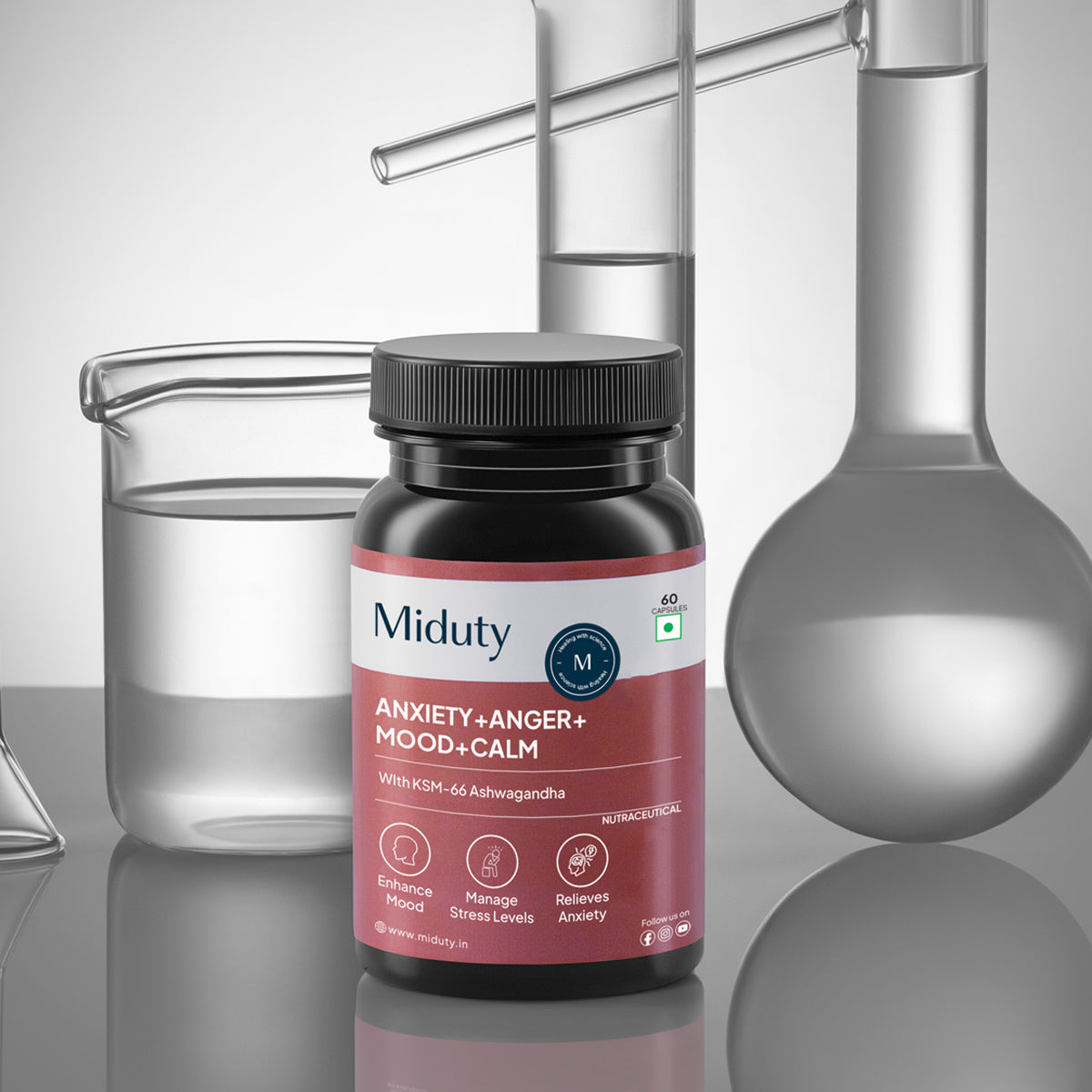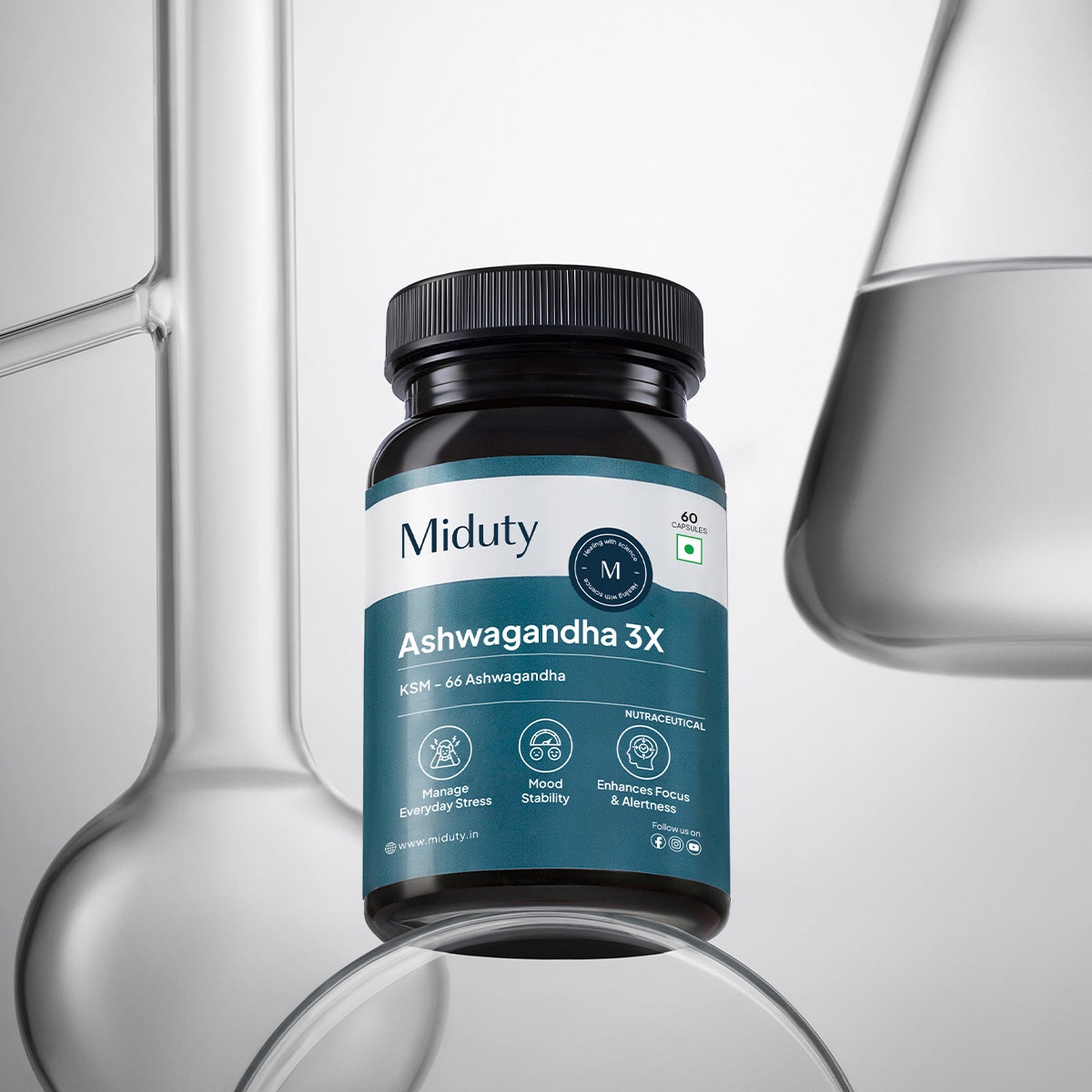
Uses and Benefits of Vitamin B12 and Vitamin D3 Backed by Science
In India, we often think our home-cooked, vegetarian meals keep us healthy. But the truth is, Vitamin B12 and D3 deficiencies are alarmingly common yet largely ignored. Our plant-based diets lack B12, and our modern indoor lifestyles mean we don't get enough sunlight to produce D3 naturally.
Symptoms like constant tiredness, low mood, or weak immunity? These could be signs your body's running low on these essential nutrients. The worst part is, we often blame stress or aging, not realizing the real cause.
This blog dives into the key benefits and uses of Vitamin B12 and D3, why so many of us are deficient, and how to fix it before it takes a toll on your health.
Key Takeaways
1. India's Hidden Deficiency Crisis: Despite our "healthy" home-cooked meals, most Indians lack Vitamin B12 and D3 due to vegetarian diets and low sun exposure.
2. The Energy & Immunity Power Duo: B12 boosts red blood cell production, D3 supports your immune system—together, they supercharge your energy and defenses.
3. Mood, Memory & Muscle Magic: Low on motivation or feeling foggy? B12 and D3 work hand-in-hand to sharpen your brain and strengthen your muscles.
4. Smart Nutrition Starts with Smart Supplements: Go for chewable B12 with methylfolate and D3 with K2 + A for better absorption and real results.
5. A Small Change, A Big Impact: Just a few minutes of sun and the right daily supplements can transform your energy, mood, and long-term health.
What is Vitamin B12?
Vitamin B12, also known as cobalamin, is a water-soluble vitamin that's essential for neurological function, red blood cell formation, and DNA synthesis. It's naturally found in animal products, which means vegetarians and vegans are particularly at risk for a deficiency.
Your body needs B12 to make healthy red blood cells. It also supports the normal functioning of the brain and nerves. Think of it as fuel for your body's internal wiring—without it, things start to short-circuit.
What are the Benefits of Vitamin B12?
1. Boosts Energy Levels
Feeling constantly tired or sluggish? B12 helps your body convert food into glucose, which your cells use for energy. When you're low on B12, that energy transfer is disrupted, leaving you feeling like you're dragging all day.
2. Improves Mood and Brain Health
B12 is crucial for producing serotonin and dopamine—neurotransmitters responsible for mood regulation. It's no coincidence that low B12 levels are linked to depression and cognitive decline.
3. Supports Healthy Skin, Hair, and Nails
Because B12 plays a role in cell production, it contributes to healthy-looking skin and strong hair and nails. A deficiency can cause discoloration, dryness, and even hair thinning.
4. Prevents Birth Defects
During early pregnancy, adequate B12 levels are essential for fetal brain and nervous system development. Low levels increase the risk of neural tube defects and miscarriage.
5. Reduces Risk of Heart Disease
B12 works alongside B6 and folate to control blood levels of homocysteine—a compound linked to heart disease when present in high amounts.
What is Vitamin D3?
Vitamin D3, also known as cholecalciferol, is a fat-soluble vitamin that your body produces when your skin is exposed to sunlight. Unlike B12, which is mainly obtained from diet, D3 synthesis depends largely on sun exposure. D3 helps your body absorb calcium and phosphorus—two minerals critical for building and maintaining strong bones.
Think of Vitamin D3 as your body's bone-building foreman. Without it, calcium can't be properly absorbed, which increases your risk of fractures, osteoporosis, and even rickets.
What are the Benefits of Vitamin D3?
1. Strengthens Bones and Teeth
D3 enhances calcium absorption in your gut. Without it, even if you consume a calcium-rich diet, your body won't be able to use it efficiently. Long-term D3 deficiency leads to brittle bones and dental issues.
2. Boosts Immune Function
Your immune cells have vitamin D receptors. When vitamin D binds to them, it activates the immune system and helps you fight off viruses and bacteria. That's why D3 is often recommended during flu season.
3. Improves Mood and Reduces Depression
Just like B12, low levels of D3 are associated with mood disorders. Sunlight exposure, which triggers D3 production, has been shown to help reduce symptoms of depression.
4. Supports Heart Health
Studies show that Vitamin D3 plays a role in reducing high blood pressure and lowering inflammation, both of which are major risk factors for heart disease.
5. Aids in Weight Loss
Some studies suggest that people with adequate D3 levels find it easier to lose weight. It might help regulate appetite and improve metabolic function.
How Vitamin B12 and D3 Work Together?
While Vitamin B12 and D3 serve different purposes, they actually complement each other in keeping your body and mind in peak condition. Think of them as teammates—one boosts your internal wiring (B12), and the other strengthens the framework (D3).
1. Energy and Immunity Combo: B12 supports red blood cell formation, while D3 enhances immune function. Together, they improve oxygen flow and help your body fight infections more effectively.
2. Brain and Mood Balance: Both vitamins are known to influence mood and cognitive health. A lack of B12 can lead to memory issues, and D3 is closely linked with depression and anxiety. When taken together, they create a synergistic boost to mental well-being.
3. Nerve and Muscle Function: B12 keeps nerves healthy, and D3 supports muscle strength and coordination. Their combination is especially powerful for older adults to prevent falls and maintain mobility.
In short, B12 and D3 support different systems, but their collective impact helps keep your energy high, your mind sharp, and your immune system resilient.
How to Get Enough of Vitamin B12 and Vitamin D3?
It's entirely possible to maintain healthy levels of B12 and D3, but it takes a little effort—especially in the Indian context.
Getting Vitamin B12:
-
Animal Sources: Eggs, milk, curd, paneer, fish, chicken, and liver.
-
Fortified Foods: Breakfast cereals, nutritional yeast, and plant-based milks fortified with B12.
- Supplements: A great option for vegetarians and older adults, especially in tablet, sublingual, or injectable form.
Getting Vitamin D3:
-
Sunlight: The best natural source. Just 10–30 minutes of direct sunlight (preferably between 11 AM and 3 PM) on bare skin can be enough, 3–4 times a week.
-
Food Sources: Fatty fish like salmon and sardines, egg yolks, butter, and fortified dairy products.
-
Supplements: Ideal for those with limited sun exposure, especially in monsoons or winter.
Consistency is key. Whether through diet, sunlight, or supplements, maintaining adequate levels helps prevent long-term health issues.
How to Choose the Best Supplements?
For Vitamin B12, choose supplements that contain methylfolate—e the active, bioavailable form your body absorbs and uses efficiently. B12 tablets should always be chewable or sublingual to ensure direct absorption into the bloodstream. For Vitamin D3, look for products that combine it with Vitamin K2 and A. D3 helps absorb calcium, while K2 directs it to the bones and prevents artery calcification; Vitamin A supports immunity and works in synergy with D3. The cholecalciferol form is ideal, especially in liquid or softgel formats taken with food. Always buy from reputable brands with FSSAI or GMP certification and steer clear of unnecessary additives.
Conclusion
Vitamin B12 and D3 may seem like small nutrients, but they have a massive impact on your health especially for us Indians, where vegetarian diets and indoor lifestyles make deficiencies common. From energy and mood to bones and immunity, these vitamins keep your body running at its best.
Thankfully, getting enough is easy. Choose a good chewable B12 with methylfolate and a D3 supplement with K2 and A, add a little sunlight, and you're set. Don't wait for your body to crash, start supporting it today, and feel the difference in your daily life.
Frequently Asked Questions on Vitamin B12 and D3 -
Q1 - Can you take vitamin B12 and D3 together?
Yes, it's generally safe and even beneficial to take vitamin B12 and D3 together. There are no known negative interactions between the two, and they can be taken at the same time. In fact, some research suggests that combining them might enhance their overall effectiveness.
Q2 - What are the benefits of taking vitamin B12 and D3 together?
Taking vitamin B12 and D3 together can provide multiple health benefits. They support brain and nerve function, improve mood, strengthen the immune system, and promote healthy bones. While each vitamin has its own role, using them together may help enhance their overall impact on your well-being.
Q3- What is the best time to take D3 and B12?
Vitamin B12 is best taken in the morning with water for energy support. Vitamin D3 should be taken with a fat-rich meal, either in the morning or evening, based on how your body responds.
Q4 - Can I take Vitamin B12 and D at night?
Vitamin B12 is best taken in the morning, as it may boost energy and affect sleep if taken at night. Vitamin D can be taken in the morning or evening, depending on what suits you best.
Q5 - How to increase B12 and D3?
To boost your Vitamin B12 and D3 levels, include foods like meat, fish, eggs, and dairy for B12, and fatty fish, egg yolks, fortified foods, and sunlight for D3. If you're deficient, consult a healthcare professional for supplements.
References
| Sr. No. | Reference Links |
| 1. | Vitamin B12 Supplementation: Preventing Onset and Improving Prognosis of Depression |
| 2. | Vitamin D and cardiovascular health |














